- Home
- Ninie Hammon
Trapped (Nowhere, USA Book 3) Page 2
Trapped (Nowhere, USA Book 3) Read online
Page 2
They didn’t have no proper baby bed, but Abby’d fixed up a little cardboard box with blankets and it’d suit just fine.
Even so, Shep figured she’d go home and get that room ready and then she would drive on back to Lexington, not even stay the night ‘cause she didn’t want to be away.
He’d been proud of her that she had done the smart thing, got herself some rest, was gonna come all full of energy and love and … and …
She’d told him she’d be there in time so’s she could feed the baby before they went home. She wanted to nurse him his first time there, where the neonatal nurses would be around to help out and … mostly just to cheer her on.
When the morning come full on and she wasn’t there yet, he figured she’d either got stuck in traffic — Abby wasn’t used to driving in the big city — or she’d had car trouble. That poor old truck was like to fall apart any second. Assorted members of Shep’s huge family had come up to Lexington to be there to welcome Cody and Abby when they wheeled the two of them out to the car. They’d all stayed at his brother’s house so there’d be plenty of folks to go get her soon’s she called and said where she’d broke down.
But she didn’t call.
And she didn’t come.
When the nurse come in and said they’s gonna have to go ahead and feed Cody because he was crying real hard, Shep’d knowed right then in his gut that something was wrong. Bad wrong.
By noon, he was so frantic he couldn’t sit still. They’d tried to call the neighbors and her sisters and brother to see if they knew where she was but something was wrong with the phones. They just rang but didn’t nobody answer.
They checked Cody out and Shep rode in the front of his brother Roger’s truck, holdin’ that baby — they was gonna get a carseat and all that, but right now — kept his head ducked down kinda covered up in the baby’s blankets so his brother wouldn’t see that he was crying.
When they turned off Sawmill Lane onto that little road that didn’t have no name where their house was …
Everything after that was crazy jumbled up in Shep’s head and he couldn’t sort it out now, figure out what had happened when.
He remembered scraps of it pretty well — remembered his mama holding Cody, standing by the front of Roger’s truck while Shep screamed and kicked in the back door of somebody’s black Ford Tempo. He didn’t know whose it was. He didn’t remember nothing about the Kentucky State Police, but somebody said they’d called them. Said they come and looked and took down stuff on forms on a clipboard and said they’d get right on it.
Didn’t nothing come of it, though.
He remembered his mama setting him down in that old rocking chair on her porch that had a view back into Nower County from Flatrock Ridge in Beaufort County. She’d handed him Cody and told him — with tears in her eyes — that he had to look after his baby son best as he could and the whole family would help.
He sat there and rocked, just rocked. He didn’t seem to be able to think what to do so they all told him he needed to eat, or sleep — but he didn’t do neither one of them. Mostly, he just held Cody, fed him when his mama give him a warmed-up bottle of formula that didn’t set well with the little fella’s stomach and he puked up most of it.
Didn’t matter no more that Shep didn’t go to work. They’d laid him off, said it wasn’t the same as firing him but it still meant he didn’t have no job. Not that he could blame them — they was work to be done and Shep wasn’t never there when he was supposed to be to do it.
It wasn’t until he went over to his and Abby’s house, made himself go, that a tiny thread of sense began to pull free of the insanity. Went by himself ‘cause he didn’t have no idea how he was gonna respond to it or what he might do and he didn’t want nobody around to see. What he done was just sit there. Didn’t cry nor scream nor talk … didn’t even think, really. He just sat there. And once he’d got real quiet, he seen how quiet the place was. A funny kind of quiet that wasn’t hollow sounding like most quiet. Echo-y like, the way the church building sounded when you was the last one to leave and you cut off the lights and walked up the aisle through the sanctuary in the dark. That silence sounded big and empty.
The silence in his house where his wife and baby son was supposed to be but wasn’t, was not empty silence. It was full, swollen silence. Silence stretched so tight over sound that it was bulging out on all the sides, about to pop.
You could put your ear up to that kind of silence and if you’s real quiet, you could hear the sounds in the silence. No, on the other side of the silence. The voices. Whispering.
The whispers sounded like the not-sound of sand blowing across rocks. Or death beetles scrambling, scarabs they was called.
And after a while, Shep got where he could pick out one voice in particular in all the whispers. Abby’s.
Chapter Three
Even after almost ten days of rehearsals, Stuart McClintock still didn’t know what he would say when he saw his wife, only that it would most certainly not be, “No, wait, please … I can explain.” He didn’t want to sound like a B movie. And he really could explain. Just had to get Charlie to hold still, stop exploding all over the place long enough to listen to him
Charlie had mentioned once that finding her mother’s house was easy, as finding mountain houses went. The road from Lexington was County Road 278 East. Just stay on it until you hit the road her mother’s house was on — Barber’s Mill Road — and turn right. Now that he couldn’t stay on one main road, he’d have to cobble together a meandering route down one tiny road after another running roughly parallel, the best he could tell, to the county road.
Half a mile later he was totally lost.
How did these people ever figure out where they were going on all the winding, twisting mountain roads — most of which had no road signs, by the way? He wondered if that was chance or intentional.
During World War II, the British got their hands on Hitler’s land invasion plan for England and it called for dropping paratroopers onto three “downs” — British for meadows — around London. So the people near those places changed all the road signs. The signs pointed to Somewhere, This Place, That Place, Another Place Altogether. Maybe these mountain people took down the signs because they figured that the people who lived here didn’t need signs to tell them where they were going and people who didn’t live here needed to go on back where they’d come from and leave them alone.
More likely, the signs just got knocked/shot off at some time in the past quarter of a century and nobody’d ever bothered to put them back up. Charlie had told him how “nowhere people,” the residents of Nower County, felt about it — that the only good view of it was in the rearview mirror. He was sure they had their reasons, but he certainly didn’t share that sentiment! Stuart thought the mountains, though maddeningly confusing, were stunning, breathtakingly gorgeous. If there were any way for outsiders to get here … to find here, this place could be turned into a tourist attraction for weekend getaways for city dwellers in five states.
Of course, that wouldn’t work because the people of Nower County — Nowhere County — wouldn’t welcome strangers with open arms. Charlie’d told him about that, too, how the isolation of the mountains had bred a clannishness that had to be seen to be believed, and a distrust of any and everybody who couldn’t trace their Kentucky ancestry back at least three generations.
He finally found a little road that lead into Nower County called Blandford Lane. The first paved road — there were several gravel tracks — that branched off Blandford Lane was called — duh — Blandford Branch and it led in the direction he thought he was supposed to be going. (Just don’t turn off Blandford Branch onto Gopher Hill Road because it dead-ends, just stops at a creek where once there’d been a bridge, though nothing remained but hunks of concrete and rusty metal.) Beyond Gopher Hill Road, Blandford Branch ended at another road with a sign that was so full of bullet holes it was unreadable. He flipped a mental coin and chose a left
turn on that road which led him to a road that did have a sign identifying bullet-hole road as Byrne Lane and the cross road as Sander’s Lane which was something approaching a “real road” by Stuart’s definition, one the state road crews might consider essential enough to plow when the snow fell.
Seriously? What was he thinking? He’d bet his whole stock portfolio that none of the roads in Nowhere County ever got plowed, no matter how essential they were.
A randomly selected right turn on Sander’s Lane led to an underpass beneath what was probably a no-kidding, for-real “main road,” but there was no access to it.
He had not seen a human being since he had crossed over into Nower County so the “just ask anybody” part of Charlie’s description of where her mother lived certainly wouldn’t have worked for Stuart today.
No human beings, but a plethora of wildlife. Deer wandered out onto the road and instead of the proverbial deer-in-the-headlights terror, they held their heads high in a haughty challenge. Hey, Bub, I live here. You don’t. I’ll thank you to slow down. You might hit me.
He saw other furry critters that he thought might have been woodchucks, weasels or badgers — he didn’t know the difference — and a gaggle of wild turkeys (was gaggle the collective noun for wild turkeys?). He had smelled a skunk, though gratefully he hadn’t caught sight of it.
City boy that he was, Stuart would have been delighted and charmed by the flora and fauna if his gut hadn’t been tied in such a knot of apprehension he was having trouble sitting up straight in the seat.
He passed a gravel track on the left with a crude hand-lettered sign nailed to a tree that read “Little Bear Mountain Sawmill.”
Charlie’s mother lived at the foot of Little Bear Mountain, and when the next crossroads — complete with sign! — announced that the road was Barber’s Mill Road, he turned left toward the mountain. The house couldn’t be far now, around the next bend, or the next — and even after all this time, Stuart didn’t have any idea what he was going to say to her.
What would Stuart do if Charlie wasn’t here?
Of course she was here. Where else would she be?
Then why hadn’t she returned the rental car to the agency at the Lexington Airport? Or at least called to report that she’d be keeping it for an extra amount of time? That made no sense.
Neither did missing calls with her publisher. The two combined had lit a fire under Stuart, propelled him to Kentucky to find her. And tell her something besides “no, please wait … I can explain.”
And he could explain. There really was a reasonable, not-break-up-a-marriage explanation for what Charlie thought she had discovered that had sent her literally “running home to Mama’s.” Well, to Mama’s house. Her mother had died two months ago and Charlie’d been saying she needed to schedule a trip to Kentucky to “tie up the loose ends of her mother’s life.”
His two-week trip to Seattle had ended up taking almost three, and he’d called her about his delay. She didn’t pick up, or return his messages, but that wasn’t strange. When Charlie got in the zone writing, she fell into a deep hole of creativity and pulled the dirt in after her. She hardly ate or slept and didn’t interact with anybody other than the nanny who kept Merrie out of her hair. She had explained it to him:
“When I’m writing, there’s a movie going on in front of my face and I have to type as fast as I can to write down all that I see.”
Interruptions of any kind shattered the movie — a phone call, a doorbell, anything that broke her concentration. She said she could literally see the movie disintegrate. Like it was put together out of an infinite number of pieces of stained glass and the pieces clattered to the ground.
So he’d done what he always did when he traveled. He called and left her messages telling her he loved her, missed her, couldn’t wait to see her — but didn’t disturb her, showed respect for her creative process.
It did strike him as a little odd that the last couple of days before he came home, he had tried to leave a message on the answering machine, but couldn’t — it clicked like it did when it was full. How could it be full if Charlie’d been listening to the messages every day and erasing them?
But he had blown that off.
He’d walked into their house in pristine Clarendon Hills, the tiny village west of Chicago that was the first small town Stuart had ever lived in, expecting Merrie’s exuberant welcome and to sweep Charlie up into his arms in greeting.
Not. The house had been empty. He found a note on the dining room table beside a credit card statement with charges for plane tickets, a hotel room and meals in Hawaii circled in red with the pen Charlie used to edit her manuscripts.
“I know. I called the hotel in Oahu. Merrie and I are in Kentucky settling my mother’s affairs. You need to be moved out before we get back.”
He’d been totally flabbergasted, sickened when he realized that the note had been lying on that table for days. Which meant Charlie had spent all that time thinking he had been in Hawaii playing bump and tickle instead of negotiating a corporate merger in Seattle.
He called her mother’s house. And called. And called.
The phone just rang — not even an answering machine where he could leave a message.
If his law firm hadn’t been putting the final bow on the three weeks of work in Seattle, he’d have hopped a plane and flown to Kentucky the day he found the note. That’s what he should have done! But at the time, he’d believed — stupidly — that since he really could explain the misunderstanding, all he had to do was talk to her …
Then came yesterday’s back-to-back phone calls, a one-two punch to the chin.
One was a call from her publisher asking where Charlie was. She’d missed two conference calls about her upcoming book. The publisher had sent her the cover design — and Charlie was a fanatic about how her book covers ought to look — and had gotten no response. Hot on the heels of that call was the one from the Avis Car Rental Agency in the Lexington Regional Airport in Lexington, Kentucky. They were looking for Charlie, too, because she had rented a Chrysler Cirrus early Friday morning, June 2, and was supposed to return it by 5 p.m. Saturday. Neither the car nor Charlie ever showed up. They had tried to get in touch with her, but the phone number she had left merely rang and rang and nobody ever picked up. Exactly how they had tracked Stuart down was unclear, but what they wanted wasn’t. He was to produce the car forthwith or … followed by threats of legal action. He’d hung up before they really got rolling on that part.
After that call, he’d felt a chill down his spine, like somebody had poured ice water down the back of his shirt and it was slowly dripping from one vertebra to the next. He wasn’t the kind of man who had a sense about things. He’d known them and read about them, people who said after a tragedy, “I just had a feeling something bad had happened.” Stuart never had such feelings. He was a no-nonsense (Charlie referred to him as a “git-er done”) kind of man who either never had such intuitions or had so successfully tuned them out for his whole life that he couldn’t hear them anymore.
But he’d sensed something ominous then that he couldn’t shrug off and had booked a red-eye flight out of Chicago to Lexington, with the awful “something’s wrong, very wrong” feeling chewing at him like a lazy rat eating his guts. When he arrived, he spoke with the Avis agent who absolutely remembered Charlie and her “precious little girl.” Clearly, the agent fell into Charlie’s category of “everybody else.” That’s how Charlie referred to some people’s responses to Merrie’s obvious mixed-race heritage. There was “us” — people who didn’t even notice and people who noticed but didn’t care, and “everybody else” — people who noticed, did care, but pasted a smile on their mugs like a stick-on name tag and pretended they didn’t.
Of course, Stuart had dealt with racism in all its myriad forms his whole life, though his ‘famous football player” status had mitigated all but the most blatant forms of it in recent years. He’d grown a thick skin, no sense … what was
it Charlie always said, “getting your panties in a wad” over it. But Charlie’s panties stayed wadded up much more than his — because she hadn’t had a lifetime to learn how to deal with it and because it was directed at her little girl, and Charlie would leap across a table and rip your face off if you threatened her child.
The Avis agent wanted him to hang around to talk to the manager about the rental car that had not been returned, and Stuart didn’t have time for that, gave them a credit card number and told them to do whatever they wanted with it — charge on it the days the car had been gone past its due date, and all applicable late fees, of course — and if that didn’t suit, they could charge him the price of the car and he’d buy the thing. He didn’t care which.
He’d rented his Lexus from Hertz.
Rounding a spectacular hairpin turn, the road straightened slightly and Stuart saw a house ahead on the left. He didn’t have to see the number on the mailbox. He knew it was the house where Charlie had grown up. From the handful of references Charlie had made to her childhood he had formed a mental picture of the place and this was it. He pulled into the driveway and parked. The Chrysler Cirrus Charlie had rented from Avis at the Lexington Airport was nowhere in sight.
He turned off the ignition and sat for a moment staring at the house. And he was afraid. Not concerned. Not apprehensive. Not worried or anxious, or uneasy.
Afraid.
Suddenly, Stuart McClintock was scared to death and he had absolutely no idea why.
Chapter Four

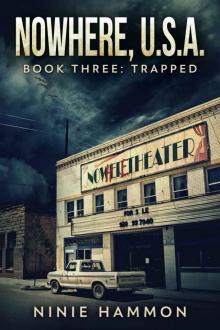 Trapped (Nowhere, USA Book 3)
Trapped (Nowhere, USA Book 3)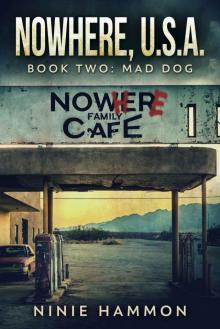 Mad Dog (Nowhere, USA Book 2)
Mad Dog (Nowhere, USA Book 2) Black Water
Black Water Nowhere USA: The Complete Series: A Psychological Thriller series (Nowhere, USA)
Nowhere USA: The Complete Series: A Psychological Thriller series (Nowhere, USA)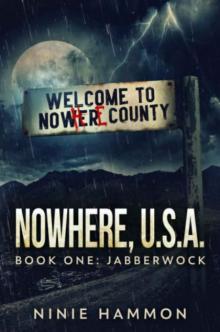 The Jabberwock
The Jabberwock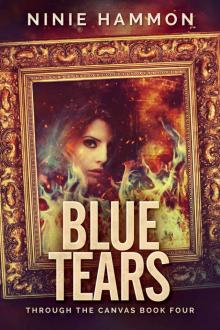 Blue Tears
Blue Tears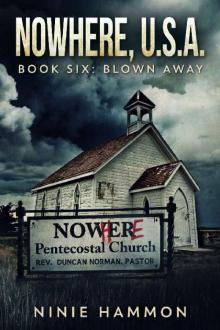 Blown Away (Nowhere, USA Book 6)
Blown Away (Nowhere, USA Book 6)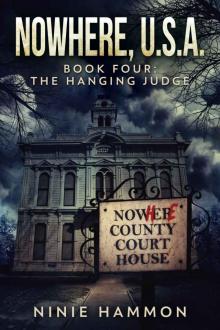 The Hanging Judge (Nowhere, USA Book 4)
The Hanging Judge (Nowhere, USA Book 4) Sudan: A Novel
Sudan: A Novel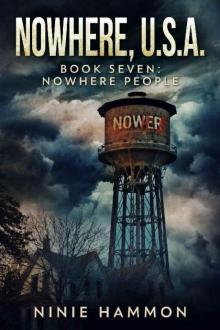 Nowhere People (Nowhere, USA Book 7)
Nowhere People (Nowhere, USA Book 7)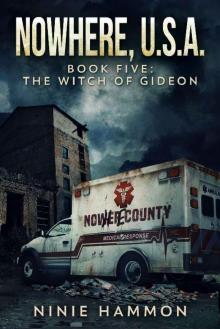 The Witch of Gideon (Nowhere, USA Book 5)
The Witch of Gideon (Nowhere, USA Book 5) Red Web
Red Web Gold Promise
Gold Promise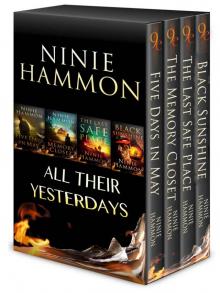 All Their Yesterdays
All Their Yesterdays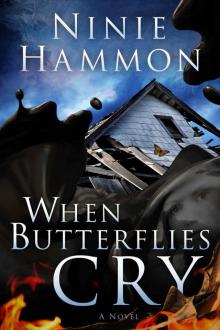 When Butterflies Cry: A Novel
When Butterflies Cry: A Novel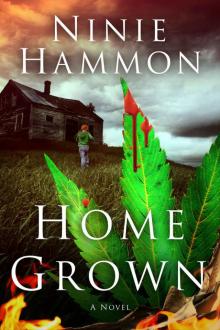 Home Grown: A Novel
Home Grown: A Novel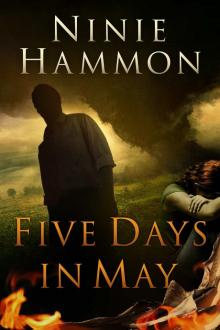 Five Days in May
Five Days in May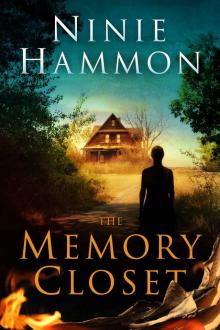 The Memory Closet
The Memory Closet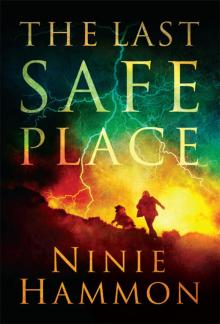 The Last Safe Place
The Last Safe Place The Knowing Box Set EXTENDED EDITION: Exclusive New Material
The Knowing Box Set EXTENDED EDITION: Exclusive New Material